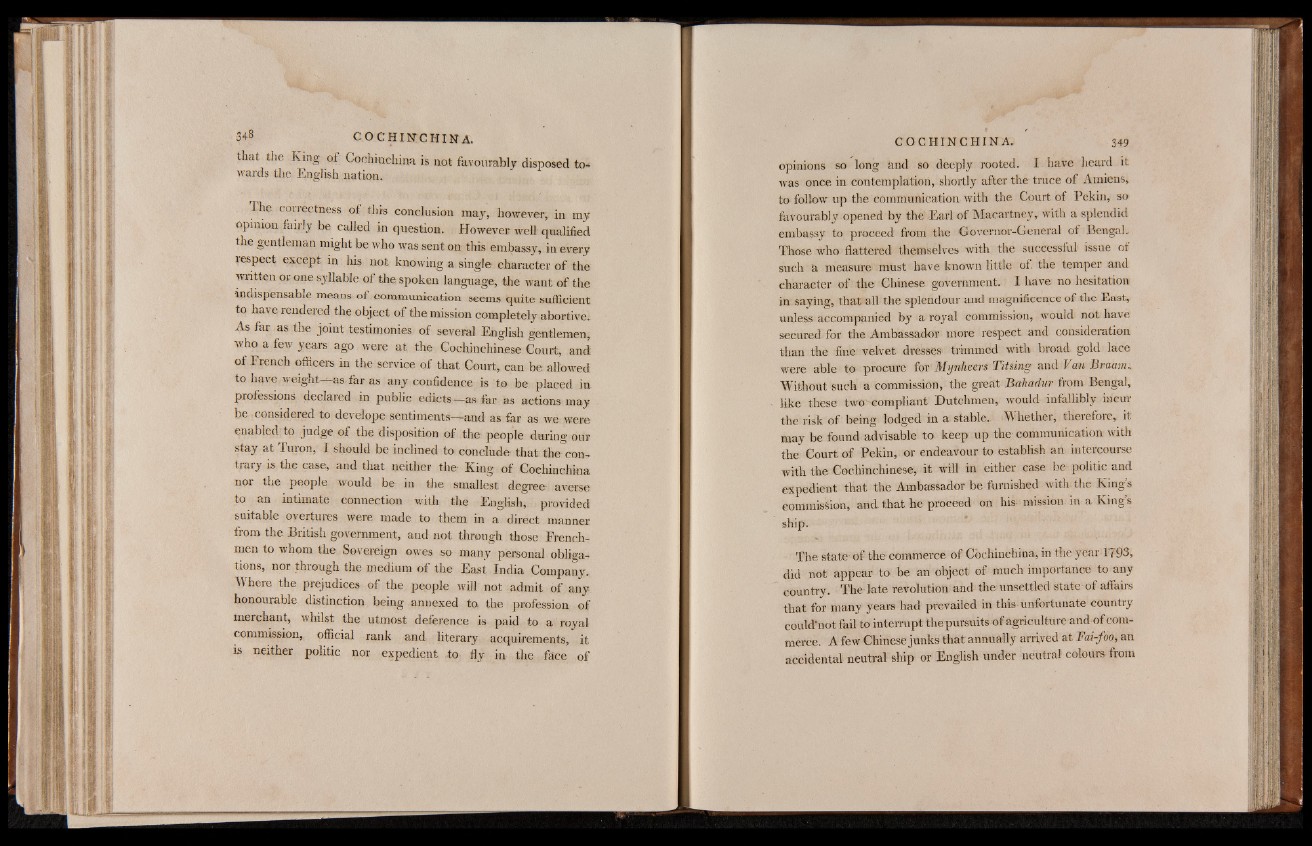
that the King of Coehinchina is not favourably disposed towards
the English nation.
.The correctness of this conclusion may, however, in my
opinion fairly be called in question. However well qualified
the gentleman might be who was sent on this embassy, in every
lespect except in his not knowing a single character of the
written or one syllable of the spoken language, the want of the
indispensable means of communication seems quite sufficient
to have rendered the object of the mission completely abortive.
As far as the joint testimonies of several English gentlemen,
who a few years ago were at the Cochinchinese Court, and
of French officers in the service of that Court, can be allowed
to have weight-^as far as any confidence is to be placed in
professions declared in public ed ic ts-a s far as actions may
be considered to dev elope sentiments—and as far as we were
enabled to judge of the disposition of the people during our
stay at Turon, I should be inclined to conclude that the contrary
is the case, and that neither the King of Coehinchina
nor the people would be in the smallest degree averse
to an intimate connection with the English,, provided
suitable overtures were made to them in a direct manner
from the British government, and not through those Frenchmen
to whom the Sovereign owes so many personal obligations,
nor through the medium of the East India Company.
Where the prejudices of the people will not admit of any
honourable distinction being annexed to the profession of
merchant, whilst the utmost deference is paid to a royal
commission, official rank and literary acquirements, it
is neither politic nor expedient to fly in the face of
opinions so long find so deeply rooted. I have heard it
was once in contemplation, shortly after the truce of Amiens,
to follow up the communication with the Court of Pekin, so
favourably opened by the Earl of Macartney, with a splendid
embassy to proceed from the Governor-General of Bengal.
Those who flattered themselves with the successful issue of
such a measure must have known little of. the temper and
character of the Chinese government. I have no hesitation
in saying, that all the splendour and magnificence of the East,
unless accompanied by a royal commission, would not have
secured for the Ambassador more respect and consideration
than the fine velvet dresses trimmed with broad gold lace
were able to procure for Mynheers Titsing and Van Braam.
Without such a commission, the great Bahadur from Bengal,
like these two compliant Dutchmen, would infallibly incur
the risk of being lodged in a stable. Whether, therefore, it
may be found advisable to keep up the communication with
the Court of Pekin, or endeavour to establish an intercourse
with the Cochinchinese, it will in either case be politic and
expedient that the Ambassador be furnished with the King s
commission, and. that he proceed on his- mission in: a King's
ship.
The state of the commerce of Coehinchina, in the year 1793,
did not appear to be an object of much importance to any
country. The late revolution and the unsettled state of affairs
that for many years had prevailed in this unfortunate country
could’not fail to interrupt the pursuits of agriculture and of commerce.
A few Chinese junks that annually arrived at Fai-foo, an
accidental neutral ship or English under neutral colours from